Advancements in Treatment Management Strategies for EGFR-Mutated NSCLC: Insights from Experts at The University of California Irvine
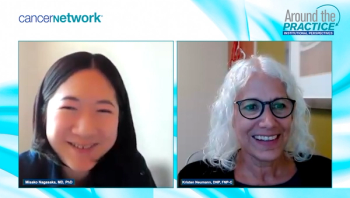
Misako Nagasaka, MD, PhD, and Kristen Neumann, DNP, FNP-C, a family nurse practitioner with 30 years of experience in oncology, discuss EGFR-mutated non-small cell lung cancer, the available treatment options, and common side effects such as rash, emphasizing patient education and proactive management for side effects.

Kristen Neumann, DNP, FNP-C, and Misako Nagasaka, MD, PhD, discuss the importance of patient education on diarrhea as a side effect of EGFR-mutated non-small cell lung cancer treatment, emphasizing dietary considerations and the use of over-the-counter remedies.

Kristen Neumann, DNP, FNP-C, emphasizes the importance of early assessment and potential dose reductions or holds when patients on treatment for EGFR-mutated non-small cell lung cancer show adverse effects, while Misako Nagasaka, MD, PhD, stresses the need for accurate symptom history and supporting lab work to ensure patient safety.

Kristen Neumann, DNP, FNP-C, highlights the value of a multidisciplinary approach in the care of patients with EGFR-mutated non-small cell lung cancer, emphasizing the roles of dermatologists, pharmacists, and nurses in ensuring thorough patient assessment and education; Misako Nagasaka, MD, PhD, highlights data from WCLC 2023 on osimertinib in EGFR-mutated NSCLC.
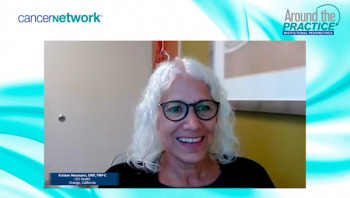
Kristen Neumann, DNP, FNP-C, emphasizes the efficacy of the drug amivantamab for patients with EGFR exon 20 mutations, explaining the challenges of unique skin rashes, but highlighting the importance of teamwork in effectively managing and treating these adverse skin effects.

Misako Nagasaka, MD, PhD, and Kristen Neumann, DNP, FNP-C, discuss the importance of early dermatological consultations and multidisciplinary education for managing infusion-related adverse events like rashes from amivantamab, emphasizing the benefits of a well-coordinated team and the value of experience in responding to reactions.

Misako Nagasaka, MD, PhD, and Kristen Neumann, DNP, FNP-C, emphasize the importance of patient education, discussing how understanding the biological reasons behind treatments for EGFR-mutated non-small cell lung cancer and their side effects can lead to better outcomes, and highlighting the need for collaborative care and clear communication.
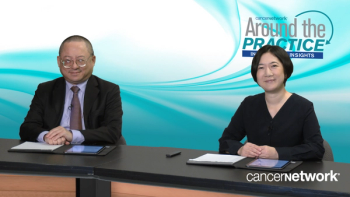
In this program, Sai-Hong Ou, MD, PhD, discusses biomarker testing for precision medicine in non-small cell lung cancer, emphasizing the importance of both tissue and blood-based genotyping, and the need for a complementary approach due to potential limitations in detecting targetable mutations.

Dr Sai-Hong Ou highlights the significance of next-generation sequencing for detecting EGFR mutations in patients with non-small cell lung cancer and the potential for adjuvant testing regardless of disease stage.

Misako Nagasaka, MD, PhD, and Kristen Neumann, DNP, FNP-C, discussed how to best mitigate adverse effects in patients with non–small cell lung cancer.
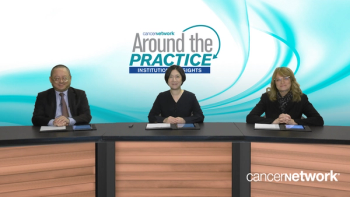
Dr Sai-Hong Ou and Dr Janellen Smith discuss the case of a 59-year-old patient with non-small cell lung cancer and an EGFR mutation who experienced severe diarrhea and acne form rash while on osimertinib, providing insights into managing these treatment-related side effects.
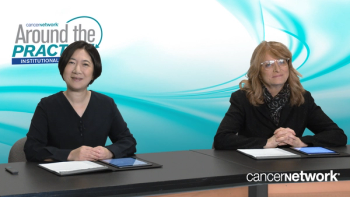
Sai-Hong Ou, MD, PhD, discusses the rapidly evolving landscape of first-line therapy for sensitizing EGFR mutant non-small cell lung cancer, including potential combination therapies and the introduction of new treatment options, such as antibody drug conjugates.

Next steps for research in lung cancer may include identifying how the gut microbiome impacts responses and adverse effects associated with treatment, says Misako Nagasaka, MD, PhD.

Dr Sai-Hong Ou and Dr Misako Nagasaka discuss the treatment strategies for EGFR-mutant non-small cell lung cancer, emphasizing the importance of individualized decision making and a multidisciplinary approach.

Drs Janellen Smith and Misako Nagasaka discuss dermatological adverse events in patients with non-small cell lung cancer associated with EGFR tyrosine kinase inhibitors, offering advice on prevention, treatment, and when to involve a dermatologist.

Sai-Hong Ou, MD, PhD, discusses the challenging management of patients EGFR-mutant non-small cell lung cancer who develop resistance to EGFR tyrosine kinase inhibitors, emphasizing the importance of understanding the resistance mechanism to tailor treatment.

Sai-Hong Ou, MD, PhD, and Janellen Smith, MD, discuss the management of a patient with non-small cell lung cancer and an EGFR exon 20 insertion mutation who experienced a rash while on treatment with amivantamab; they highlight the importance of continuous treatment and potential considerations for this patient group.

Drs Misako Nagasaka, Sai-Hong Ou, Janellen Smith discuss the management of adverse events, such as infusion reactions and rash, associated with amivantamab treatment for patients with EGFR exon 20 insertion mutations.

Dr Sai-Hong Ou discusses the future of treatment for non-small cell lung cancer with EGFR exon 20 insertion mutations, highlighting the complexity of these mutations and the need for precision treatments.

The panelists close their discussion on non-small cell lung cancer by emphasizing the need for continued research, early screening, and collaboration with dermatologists to address the unmet needs and improve overall outcomes.

Misako Nagasaka, MD, PhD, sheds light on neoadjuvant and adjuvant treatment options for patients with lung cancer.









